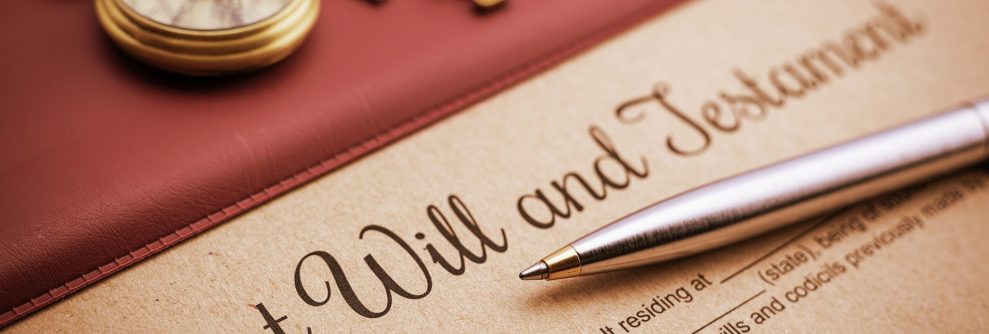Role of an Executor
بسم الله الرحمن الرحیم
Can you please clarify the following points in relation to the role of the executor of a will? Also, what should happen to properties which continue to stay on rent after the owner passes away?
- What are the responsibilities of the executors?
The executor should execute the will in conformity to sharīʿah. If the will contradicts sharīʿah principles, then the executor should explain to the inheritors why the original will should not be implemented.
In Sūrah Baqarah, āyah 182, Allah tells us that if the executor apprehends that the testator has made an unintentional or intentional mistake, but then makes a settlement between the parties, then the executor will not be at sin.[1]
Furthermore, Islamically, an executor takes charge of the one third which has been bequeathed, and is responsible for clearing any debts from the estate. Therefore, if nothing has been bequeathed; there are no debts; and all of the inheritors are adults, then the executor, Islamically, has no role to play.[2]
- I have been told that Executors (Walis?) cannot be questioned, is this correct according to Sharia?
As explained above, an executor is responsible for the one-third bequest. He cannot be questioned regarding this. However, the executor has no say in anything which is inherited by adults.
It is pertinent to point out here that an ‘executor’ is not always a walī. A walī is an adult who is responsible for children or for an insane adult. In the case of a will, an executor can be a walī if there are children involved or if there is an insane adult. In such scenarios, the walī cannot be questioned on the decisions he makes regarding the children. However, the executor cannot be deemed a walī for sane adult inheritors.
- Were we entitled to the rental income from the properties that continued to stay on rent even though we were not consulted?
When a person passes away, their estate is automatically transferred to the inheritors.[3] This means that the inheritors become joint owners in everything that the deceased left behind. This being the case, all of the inheritors will be rightful of claiming their share of the estate at that time.
Regarding the rental income and profits after the death of the deceased, if you consented to the properties staying on rent, then you are rightful of claiming your share in the rents and profits from then till now.
If, however, you did not consent to the properties staying on rent, or the properties were put on rent without even consulting you, then you will not be eligible to any rental income as you will not be considered a partner in the business venture, although you are a partner in the ownership of the property. This is just like if two brothers own a car, and one brother rented the car out for one day to his friend without the consent of his brother, both will not be deemed as partners in the business venture, although both are partners in owning the car.[4]
This being said, the inheritor who chose to invest the properties without the consent of others will have committed a sin. Moreover, it will not be permissible for that inheritor to keep that money; rather, he must give it away to free himself from the liability. Hence, it is best for that inheritor to make a calculation and give that amount of money to the other inheritors.[5]
- What should happen when selling properties that are in inheritance? Should these be sold at market value and distributed as soon as possible to the heirs? How should the heirs agree on the value of the properties? What happens if one heir wants to sell and the others don’t?
Upon death, ownership of the estate is transferred to the heirs automatically. Hence, each person has the right to sell his or her share at whatever price he or she decides. It is not mandatory that the property is sold at market value. Furthermore, if one party wants to sell and others do not, then the other inheritors should buy out the share of the inheritor who wants to cash out. However, one party cannot force the other parties to sell their shares.[6] It must be remembered, any party can sell their share of the property to an external party also.[7]
And Allah knows best
Ibrāhīm ibn Muḥammad
05/01/2023
[1] قال البيضاوي (المتوفى: 685هـ): فمن خاف من موص أي توقع وعلم، من قولهم أخاف أن ترسل السماء..جنفا ميلا بالخطأ في الوصية. أو إثما تعمدا للحيف. فأصلح بينهم بين الموصى لهم بإجرائهم على نهج الشرع. فلا إثم عليه في هذا التبديل، لأنه تبديل باطل إلى حق بخلاف الأول (تفسير البيضاوي: 123/1)
[2] قال التمرتاشي (المتوفى: 1004هـ) والحصكفي (المتوفى: 1088هـ): (وتصح قسمته) أي الوصي حال كونه (نائبا عن ورثة) كبار (غيب أو صغار مع الموصى له) بالثلث (الدر المختار على تنوير الأبصار مع رد المحتار:707/6)
قال ابن عابدين (المتوفى: 1252هـ): وذكر الإمام المحبوبي عن مبسوط شيخ الإسلام أنه في الأولى تجوز في العروض والعقار لو الورثة صغارا وإلا ففي العروض فقط، وفي الثانية تبطل فيهما كما في الكفاية والمعراج وغيرهما، وبه جزم الزيلعي. قال في العناية والفرق بين المنقول والعقار أن الورثة لو صغارا فللوصي بيعهما ولو كبارا فليس له بيع العقار عليهم، وله بيع المنقول فكذا القسمة لأنها نوع بيع (رد المحتار: 707/6)
وقال المرغيناني (المتوفى: 593هـ): وبيع الوصي على الكبير الغائب جائز في كل شيء إلا في العقار (الهداية مع فتح القدير:509/10)
وقال البابرتي (المتوفى: 786هـ): وقيد بالغيبة؛ لأنهم إذا كانوا حضروا ليس للوصي التصرف في التركة أصلا، لكن يتقاضى ديون الميت ويقبض حقوقه ويدفع إلى الورثة، إلا إذا كان على الميت دين أو أوصى بوصية، ولم يقبض الورثة الديون ولم ينفذوا الوصية من مالهم فإنه يبيع التركة كلها إن كان الدين محيطا أو بمقدار الدين إن لم يحط (العناية شرح الهداية: 510/10)
وقال السرخسي (المتوفى سنة 483هـ): … وكذلك إن كان البائع وصيا للميت؛ لأن الورثة إذا كانوا كبارا كلهم، وليس على الميت دين ولم يوص بشيء تباع فيه الدار حتى ينقد ذلك لم يجز بيع الوصي؛ لأن الملك للورثة وهم متمكنون من النظر بأنفسهم (المبسوط: 110/14)
[3] قال السرخسي (المتوفى سنة 483هـ): المال بالموت انتقل إلى الورثة (المبسوط: 69/22)
وجاء في الموسوعة الفقهية الكويتية: لا يشترط لانتقال التركة إلى الوارث قبول الوراثة، ولا إلى أن يتروى قبل أن يقبلها، بل إنها تئول إليه جبرا بحكم الشرع من غير قبول منه. وقد تكون التركة خالية من الديون، وقد تكون مدينة. والدين إما أن يكون مستغرقا أو لا،
ولا خلاف بين الفقهاء في أن التركة تنتقل إلى الوارث، إذا لم يتعلق بها دين من حين وفاة الميت (212/11)
[4] جاء في الفتاوى الهندية: لو تصرف أحد الورثة في التركة المشتركة وربح فالربح للمتصرف وحده (الفتاوى الهندية: 346/2)
وقال علي حيدر: إذا زرع أحد الورثة الحبوب المشتركة بدون إذن الورثة الآخرين أو إذن وصيهم إذا كانوا صغارا فتكون الحاصلات للوارث الزارع مستقلا ويكون الزارع غاصبا للبذر ويضمن حصة الآخرين ولم ينتج البذر أي شيء من الحاصلات (درر الحكام في شرح مجلة الأحكام: 51/3)
وفي مجلة الأحكام: إذا أخذ الورثة مقدارا من النقود من التركة قبل القسمة بدون إذن الآخرين وعمل فيه فخساره يعود عليه، كما أنه لو ربح لا يأخذ الورثة حصة فيه (درر الحكام في شرح مجلة الأحكام: 51/3)
قال علي حيدر: إذا تصرف أحد بلا إذن في مال الغير وربح يكون الربح له، ويتفرع عن ذلك مسائل عديدة: المسألة الأولى – إذا أخذ أحد الورثة مقدارا من النقود من التركة قبل القسمة بدون إذن الآخرين أو إذن الوصي إذا كان الورثة صغارا فكما أن الضرر يعود عليه ويأخذ الورثة حصتهم في رأس المال فقط كذلك لو ربح فلا يأخذ الورثة حصة من الربح إلا أنه في هذه الصورة لا يكون الربح الحاصل من حصة الورثة الآخرين طيبا للآخذ والعامل في ذلك (درر الحكام في شرح مجلة الأحكام: 51/3)
وانظر فتاوى محمودية: 309/20
[5] انظر إمداد الفتاوى: 590/9، هذا ما كتبت، ثم رأيت أن شيخنا المفتي تقي العثماني حفظه الله أفتى بذلك في شرحه على البخاري باللغة الأردية
[6] جاء في الأصل: وقال أبو حنيفة: لا أجبر واحدا منهما على بيع نصيبه في شيء سمينا في هذا الباب، وإن أراد أحدهما البيع وأبى الآخر فإن الذي يأبى لا يجبر على بيع، ويقال للآخر: بع نصيبك إن شئت أو دع (الأصل: 331/3)
وقال الحصكفي (المتوفى: 1088هـ): ولو أراد أحدهما البيع وأبى الآخر لم يجبر على بيع نصيبه (الدر المختار مع رد المحتار: 261/6)
[7] وقال علي حيدر: يصح بيع الحصة المعلومة الشائعة بدون إذن الشريك سواء كان المشاع قابلا للقسمة أو غير قابل عقارا أو منقول… لكل أن يتصرف في ملكه كما يشاء وهذا البيع من جملة التصرفات وعلى هذا كما يحق لأحد الشريكين أن يبيع العرصة المشتركة من شريكه فكذلك يحق له أن يبيع حصته من الأجنبي بدون إذن من شريكه وكما أن لمن يملك حصة في دار مشتركة أن يبيع حصته في تلك الدار مع عرصتها لشريكه فله أن يبيع هذه الحصة من الأجنبي ولشريكه حق الشفعة (درر الحكام في شرح مجلة الأحكام: 189/1)



